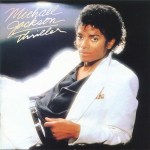
More of the Music of Michael Jackson
Reviews and Commentaries for Thriller
Dear Tom and Fred,
I surprised myself by buying a White Hot Stamper of Thriller. It’s an album that struck me as a particular challenge to your business model. This is probably the most-pressed record in existence. A hot stamper has to be a needle in a really big haystack. And besides, how much better can they be, really? Isn’t any old copy of Thriller a pretty awesome-sounding record?
And, what’s more, why do I need an expensive copy of an album that I could happily live my entire life without ever hearing again?
But hey, I’ve returned records to you before, and you’ve never once tried to convince me to keep it, or given me any headaches about a return, so why not explore the limits of what your business can provide?
The first time I put it on, I could already tell it was special. It’s not like I was “hearing new details” or something like that. It’s that I was swept up, and able to relax and enjoy a stupendous album again. Listening to this copy of Thriller brought me as much joy as this music used to.
ab_ba
Dear ab_ba,
We’ve written about this experience before. If your current copy or some new audiophile pressing doesn’t bring you the joy of the music you remember feeling back in the day, it’s not the music’s fault. It’s the record’s. Or the stereo’s.
Aaron, you have taken your system to new heights. Your ears don’t work the way they used to. While you weren’t looking, the bar somehow, rather mysteriously, reset itself. Now it’s much, much higher.
You’re simply a lot harder to please than you used to be. You have a much better understanding of how high is up, and up is a lot higher than it used to be, whether you like it or not. Good isn’t good enough anymore.
And you will never be able to go back, even if you wanted to. You could no more go back to those days than you could become a child again. [1]
Welcome to my world, post 2007.
That’s why we tout Beatles albums as being critically important for testing and tweaking your system. We know they have the life of The Beatles’ Music in their grooves, giving you the sound you remember falling in love with all those years ago.
If you’re not getting a thrill from your Beatles records, something is very, very wrong — precisely the reason their recorded oeuvre is a true audiophile wake up call.
ab_ba continued:
A few weeks later, on the eve of the closing of the return window, I shot it out against the best of my other copies. They range from the copy I grew up with, one of the few records from childhood that I held onto, to a pricy Japanese pressing in great shape (purchased long ago, when I thought Japanese pressing were where it’s at), to some copies I’ve picked up over the years because they looked to be in good shape and they were just five bucks, and a pressing that the forums told me was the “holy grail.” None stacked up to the white hot stamper. In fact, they really weren’t even close. Here’s what I found:
The copy I grew up with is bright and edgy. To think, I spent all those years playing and re-playing a record that was bright and edgy, none the wiser to matrix numbers and pressing variations. Some other lucky kid back then was surely listening to the copy I now own. I wonder if he ever said to himself, “wow, there’s something about this record. It sounds really special.”
The pressing with a sought-after matrix code had phenomenal bass, but the vocals were recessed. I’d so easy to be impressed with those huge drums on Billie Jean, but that alone is not enough to tell you it’s a great pressing. A lot of pressings seem to get that right.
My Japanese pressing was clear and full. But too smooth. The guitars don’t bite. Also, it fatigued me by about halfway through the side. This is energetic music. It might exhaust you, but it doesn’t have to fatigue you. This is an example of where if you don’t have a white hot stamper to compare it to, you’ll just assume your version sounds as good as it can get.
ab_ba,
Japanese pressings are almost always made from dubbed tapes. You’re describing the smeary, distorted sound you get from a second-generation tape. Less bite on the guitars, more fatiguing harmonic distortion everywhere else, these records are only playable on modestly revealing systems.
After getting my system to a higher level and playing the imports I owned head to head against good domestic LPs, I got rid of my Japanese pressings.
That was more than 30 years ago. It was simply no contest. I was actually embarrassed to have them in the house. What a fool I had been.
So, at one end of the spectrum, I have my Ricci hot stamper [shown here] that I could sell for what I paid you for it, and now at the other end of the spectrum I have a hot stamper that you probably paid $5 for, but is a true “needle in the haystack.” I wonder how many $5 copies (now, $20) I’d have to buy on my own to find one that sounds this good, and how many hours that’d take me, and what would I do with all the copies I wouldn’t want to keep? I’ll leave all that hassle to you, and I’ll be keeping this copy of Thriller. The price I paid is worth it to me to again love and enjoy this truly phenomenal album.
This is a common criticism levelled at us by audiophiles on forums. They find our pricing of common records outrageous. They seem to think we buy our records for dollars and sell them for hundreds, with percentage markups typically in the thousands.
There was a time when Thriller in Los Angeles might have been a ten or fifteen dollar record. Those days are long gone. A clean pressing would easily run $40-50 and maybe even more if it were still in the shrink with the stickers. (At Amoeba records, where we used to shop, a so-so record in a clean cover would always be priced higher than a clean record in a ratty cover. We think that speaks volumes about record buyers and record collectors these days.)
We hear there are stores that have records like Thriller for cheap, but we are not able to drive to those stores, many of which are in other states. We willingly pony up the fifty bucks we have to pay because we love the record and so do our customers.
Our hottest stamper copies have the sound you always wished it had, the perfect sound that really only existed in your head back then. Think of all the money and time you had to put into your stereo to get that perfect sound to come out of your speakers.
And no matter how good your equipment, only a top quality pressing could possibly turn that idea into a reality.
Your experience proves that all the money, time and effort you put into your system was justified, many times over. Without all of your work, and our Hot Stamper, Thriller would just be another album you used to like, one you kind of grew out of, one that doesn’t sound the way you remember it sounded, and it would be sitting there on your shelf collecting dust.
The work you did (with some help from us) paid off. Now Thriller is back, and better than ever. What is that worth?
A PS from ab_ba
I’m really surprised how much I like it. It’s an even bigger “delta” from the run of the mill copies than most of my hot stampers, even white hot stampers, are.
ab_ba,
Summing up, we thank you again for another wonderful letter. We love it when our customers take the time and make the effort to do their own shootouts, especially when we win, which is what happens about 99% of the time.
A few other thoughts, on and off the subject.
Thriller is a tough record to master. Lots of boosted EQ in places, hard to get right. Bernie can take great pride in a job well done.
Some of these things are system dependent. Some records “lock-in” to a system in surprising ways and just really take off.
That’s what Bob and Ray does for my system, it just takes off like crazy.
Recently a good Brothers in Arms did the same thing. I put it in our Top 100, the first time it ever impressed me that way. It sounded as big as a house.
(And the Chris Bellman recut is excellent, about A+, maybe 1.5, about as good as heavy vinyl gets. I would put it in the Top 1%. To say that we are rarely impressed by any album on Heavy Vinyl these days is the understatement of the year.)
Best, TP
(more…)
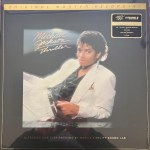 More of the Music of Michael Jackson
More of the Music of Michael Jackson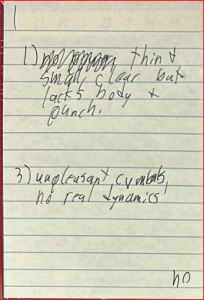 Side One:
Side One: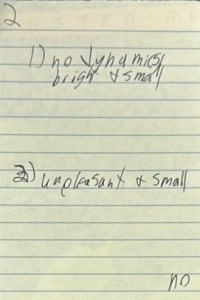

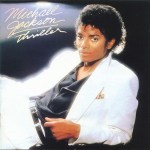



 More of the Music of Michael Jackson
More of the Music of Michael Jackson

